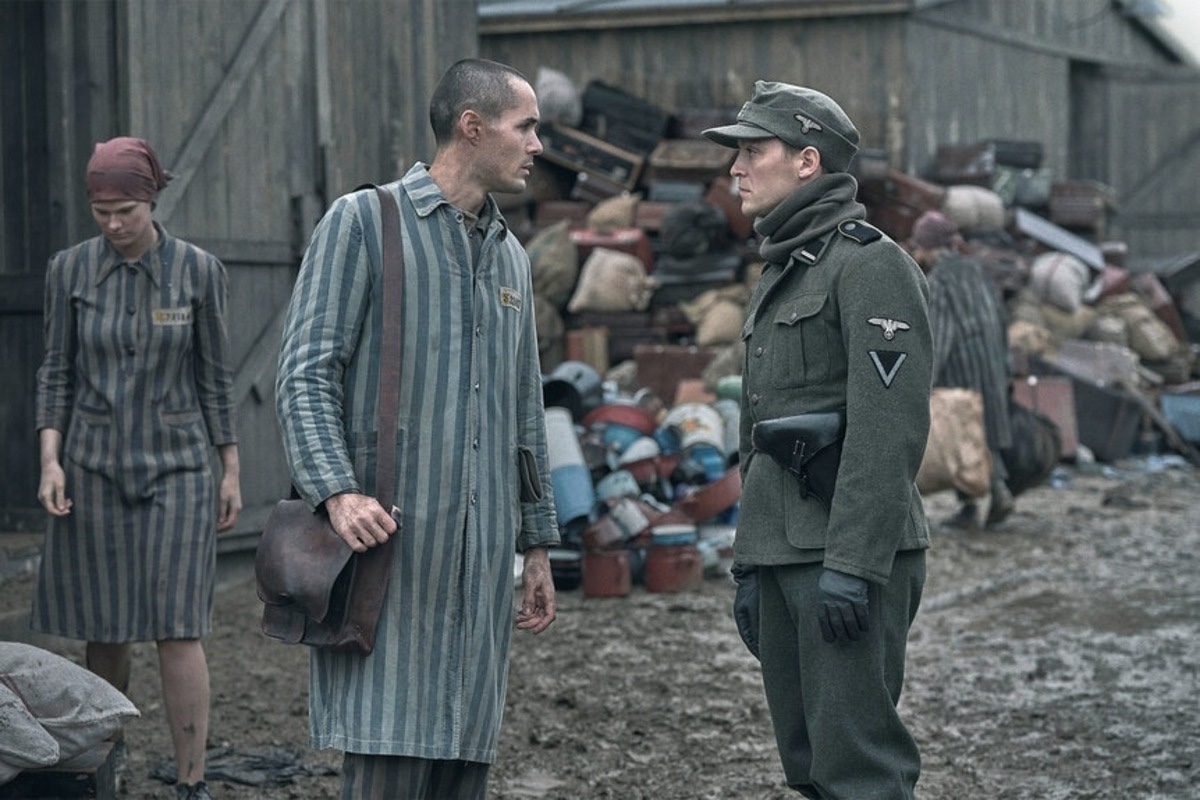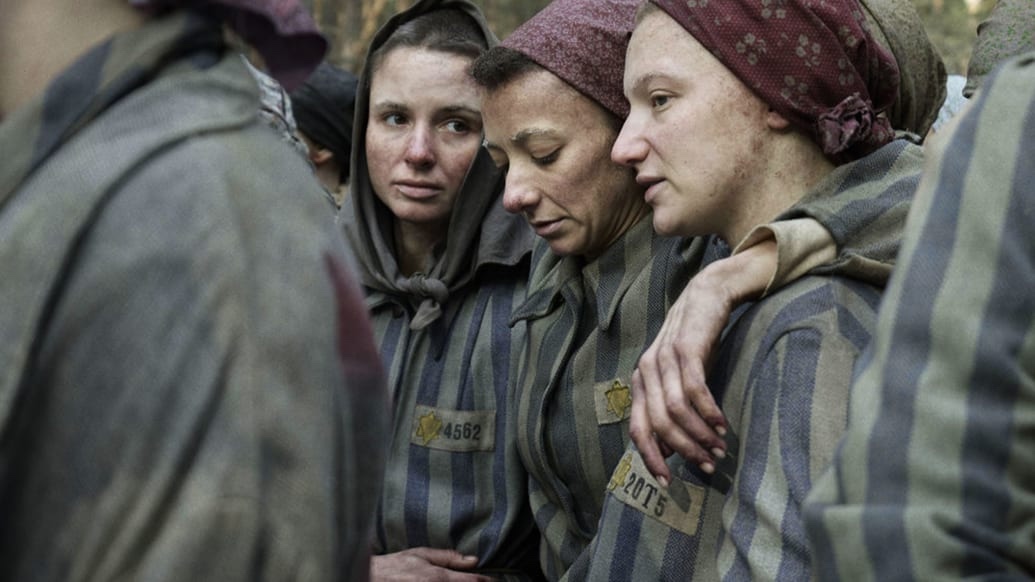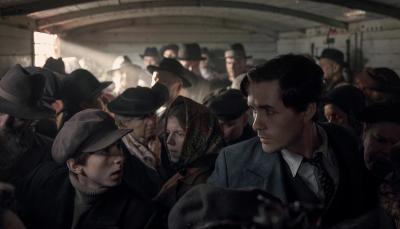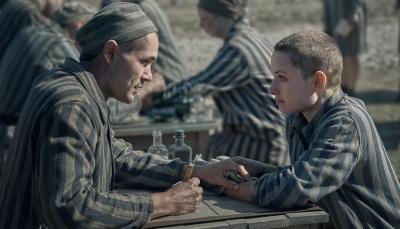'The Tattooist of Auschwitz' Is a Harrowing Drama
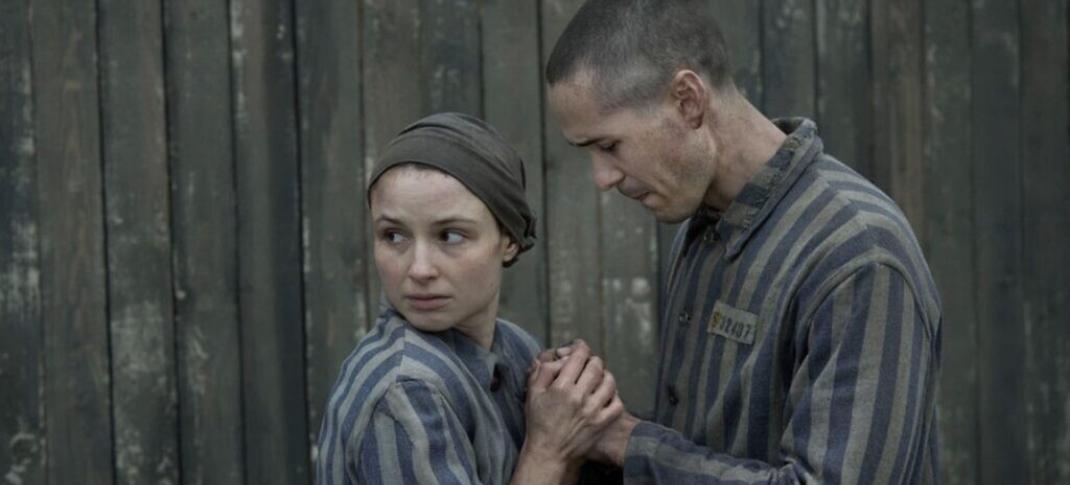
Jonah Hauer-King (Lali Sokolov) and Anna Próchniak (Gita Furman).
© NBCU
The global debut of Sky/Peacock’s The Tattooist of Auschwitz was timed for May 2, the anniversary of the fall of Berlin in 1945, and the conclusion of this year’s Passover. It is particularly timely with a rise in anti-Semitism and a right-wing swing both here and in Europe (raising the issue that those unspeakable creeds and beliefs never really went away). The six-part series presents a love story set in an unbelievably cruel world of violence and moral ambiguity, a reminder of the worst of us and our best. It challenges us to question what we would do should we ever have to choose between integrity and survival; not surprisingly, it’s difficult viewing.
The series is directed by Tali Shalom-Ezer (The Psychologist), adapted from Heather Morris’s 2017 book of the same name, with an accomplished global cast. Morris consulted with writers Jacquelin Perske, Evan Placey, and Gabbie Asher, correcting some of the errors in her book. Hans Zimmer (Dune) and Kara Talve (Prehistoric Planet) wrote the soundtrack, and Barbra Streisand’s new song, “Love Will Survive,” her first release in six years, plays over the closing credits.
Aged Auschwitz-Birkenau survivor Lali Sokolov (beautifully acted by Harvey Keitel, Life on Mars), recently widowed and now an Australian citizen, breaks his silence over what happened sixty years ago. Running out of time, he has put out a call for someone to chronicle his story. Medical administrator, mom of three, and aspiring writer Heather (Melanie Lynskey, Yellowjackets) responds. Their relationship develops into a close, sweet friendship. Lali initially defines his as a love story, but his tone suggests irony, longing, skepticism, and loss. Heather wants it to be a love story, and we discover with her that it’s also a story of survival, courage, and guilt. We all want a happy ending, no matter how harrowing the journey may be.
Young Lali (Jonah Hauer-King, World on Fire), who works in a department store in Bratislava, Slovakia, loses his job because he’s Jewish and rejoins his family in the country. (Slovakia at this time, 1942, was a client state of Nazi Germany.) An order is given that each household must provide an adult for war work in Poland, and the happy-go-lucky young man boards a train despite a last-minute warning from a friend. Auschwitz is a nightmare of horror, violence, and unpredictability, where death can occur for no reason at any time. The dead are never far away. The narrative is interrupted by footage of the dead, staring at the camera and us, accompanied by an eerie ripple of strings. Sometimes, we know these people have died; sometimes, it’s a narrative shortcut.
Lali is trained as a tattooist, knowing that it increases his chances of survival, with better living conditions and more food. He also knows that now he’s working for the SS. He assuages his conscience by doing his work as gently as possible and apologizing for causing pain because his goal is survival at any cost, particularly once he meets the love of his life.
Unbelievably, he falls in love with Gita Furman (Anna Próchniak) as he tattoos her arm, and she jokes that she wants pink ink. From then on, they are both determined to survive, against the odds, and Lali finds an unlikely ally in the form of SS officer Stefan Baretzki (Jonas Nay), who acts as a go-between. It’s a complex relationship to understand, abusive and transactional, with an intimacy that doesn’t end with death. Stefan haunts Lali six decades later, appearing in his apartment, prompting unwelcome memories, and challenging his version of events. Several times, Lali has to backtrack and tell Heather what happened. She takes it as proof of his failing memory, or regret – for instance, that he didn’t say goodbye properly to his mother, finding out later that nearly all of his family were taken to the camps.
Gita works in the luggage warehouse, where she is one of a team of women who sort valuables from the suitcases inmates were forced to abandon, and, under the nose of the guards, steal small items to use as bribery, payments, or to sell after escape. Those who are placed in positions of comparative power – as tattooists, block elders (appointed to keep discipline in the barracks), or guards – set their own limits. Lali is questioned by SS officers when his stash of valuables is discovered and beaten to reveal the names of all involved.
He keeps silent, and the prisoner assigned to beat him, Jakub (Dylan Corbett-Bader) is careful to avoid breaking any bones, but also tells Lali that had he given any names, he would have killed him. It’s a compromise for Jakub to spill as little innocent blood as possible, and Lali understands. Similarly, block elder Marta (Avital Love) grudgingly accepts payment to lend her private living space to Gita and Lali. She helps when one of the women gives birth in the barracks (the baby survived and came to the U.S. as an adult).
Probably the worst compromise for Lali is when Gita is sick, possibly dying, and he needs to get her medication. For the first time, and challenged by Stefan, Lali tells Heather the appalling true story of how he paid. Heather reminds him that he had no choice, which he accepts, but she is horrified, and so are we.
If The Tattooist of Auschwitz has a problem as a drama series, it’s not that there is too much violence and cruelty (it’s almost certainly diluted) but that the dreadful monotony of the losses and abuse, the unspeakable everyday occurrences slow down the pacing. We see some escape attempts, and there’s a moment of hope when a U.S. plane flies overhead. A recaptured prisoner shares the news that the Allies know what is happening.
After three years in Auschwitz, Lali and Gita leave – one of Gita’s last tasks is to burn the copious, damning paperwork the camp had accumulated. But the horror is not over. On the forced march from the camp, the women support and try to warm each other in the harsh snowy weather, and Gita, huddling for warmth at night with two friends, wakes in the morning to find that one has died. Lali falls into Russian hands when he escapes and survives, finally making his way home. He and Gita find each other in Bratislava, where the bomb-damaged department store where he worked a lifetime ago is now a center for people desperately searching for family members, and they marry.
In a final irony, Lali receives a letter from a German law company representing Stefan, now accused of war crimes. He writes a lukewarm account, clearly either unwilling to end yet another life or remember those times in detail. Stefan hangs himself before the trial can take place. Emigrating to Australia does not make the past disappear, and Gita is homesick for life as it used to be. But after some years of infertility and a visit to friends still in Europe, she comes home to announce that she is pregnant. “Time won,” Lali says, after fifty-five years with his true love.
All six episodes of The Tattooist of Auschwitz are available on Peacock.


